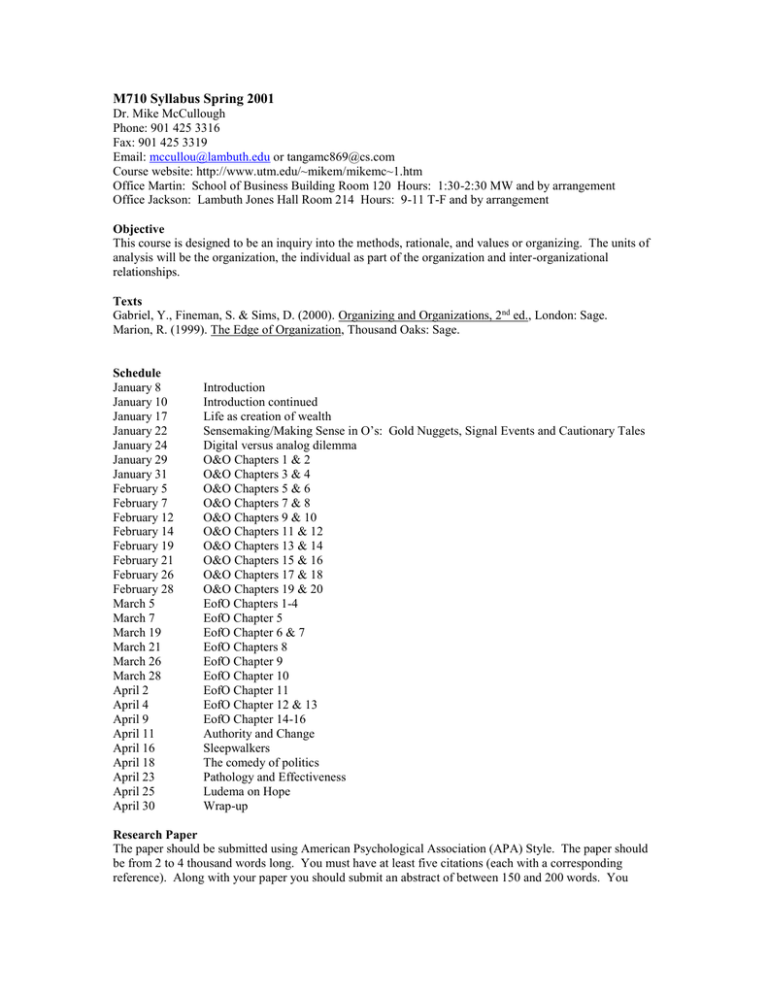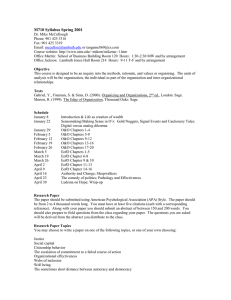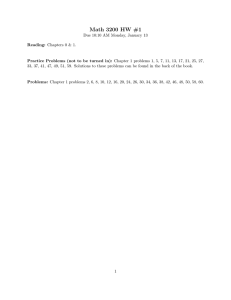M710 Syllabus Spring 2001
advertisement

M710 Syllabus Spring 2001 Dr. Mike McCullough Phone: 901 425 3316 Fax: 901 425 3319 Email: mccullou@lambuth.edu or tangamc869@cs.com Course website: http://www.utm.edu/~mikem/mikemc~1.htm Office Martin: School of Business Building Room 120 Hours: 1:30-2:30 MW and by arrangement Office Jackson: Lambuth Jones Hall Room 214 Hours: 9-11 T-F and by arrangement Objective This course is designed to be an inquiry into the methods, rationale, and values or organizing. The units of analysis will be the organization, the individual as part of the organization and inter-organizational relationships. Texts Gabriel, Y., Fineman, S. & Sims, D. (2000). Organizing and Organizations, 2nd ed., London: Sage. Marion, R. (1999). The Edge of Organization, Thousand Oaks: Sage. Schedule January 8 January 10 January 17 January 22 January 24 January 29 January 31 February 5 February 7 February 12 February 14 February 19 February 21 February 26 February 28 March 5 March 7 March 19 March 21 March 26 March 28 April 2 April 4 April 9 April 11 April 16 April 18 April 23 April 25 April 30 Introduction Introduction continued Life as creation of wealth Sensemaking/Making Sense in O’s: Gold Nuggets, Signal Events and Cautionary Tales Digital versus analog dilemma O&O Chapters 1 & 2 O&O Chapters 3 & 4 O&O Chapters 5 & 6 O&O Chapters 7 & 8 O&O Chapters 9 & 10 O&O Chapters 11 & 12 O&O Chapters 13 & 14 O&O Chapters 15 & 16 O&O Chapters 17 & 18 O&O Chapters 19 & 20 EofO Chapters 1-4 EofO Chapter 5 EofO Chapter 6 & 7 EofO Chapters 8 EofO Chapter 9 EofO Chapter 10 EofO Chapter 11 EofO Chapter 12 & 13 EofO Chapter 14-16 Authority and Change Sleepwalkers The comedy of politics Pathology and Effectiveness Ludema on Hope Wrap-up Research Paper The paper should be submitted using American Psychological Association (APA) Style. The paper should be from 2 to 4 thousand words long. You must have at least five citations (each with a corresponding reference). Along with your paper you should submit an abstract of between 150 and 200 words. You should also prepare to field questions from the class regarding your paper. The questions you are asked will be derived from the abstract you distribute to the class. Research Paper Topics You may choose to write a paper on one of the following topics, or one of your own choosing: Justice Social capital Citizenship behavior The escalation of commitment to a failed course of action Organizational effectiveness Webs of inclusion Well being The sometimes short distance between autocracy and democracy The future of leadership in organizations What women can teach men about management What men can teach women about power The importance of spirituality in organizations What we can learn about organizational theory (organizational behavior) from: (Movie, book, TV show) The future of work Managing paradox Management versus leadership Why individuals and organizations underachieve Zen and the art of organizational management How structure affects organizational effectiveness Lessons from: Valujet Crash Challenger Disaster Paducah & Oak Ridge Champion International Paper Union Carbide Grade determination Exams Midterm Final Research paper Class Participation 30% 40% 20% 10% Exam grades Exams will be all essays. The essays will be graded on clarity of expression, insight, organization, and coverage of the question. Class rules Anticipated absences should be discussed with the instructor. The midterm exam is in-class. The final is take-home. The final will pertain mainly to the second half of the class, but may draw inspiration from the first half as well. If you use sources for the answers to the take-home exam, you should give these sources as citations in the body of the paper and references at the end of the paper. Classmates are inappropriate sources. Reading Reading should be completed by the date listed on the Syllabus. Question and answer You will be expected to submit an abstract of your paper for everyone in the class by April 2 nd. You should also submit two questions, one for two separate abstracts, to be asked and answered in class (by the author of the abstract). This means each student will be the author of one abstract and two questions and the responder to one or more questions. Questions submitted by April 9 th. The instructor will serve as moderator of the question and answer session. Please do not read anything in to one student getting more discussion time than another. We will have authors respond to questions beginning on April 16 th. APA Style NOTES IN TEXT The APA calls its style "reference citations in text" and discusses them in detail on pages 168-174 of its manual. Each time you quote from another work or wish to refer to it, use the author’s name (or title, if that is how it appears in your bibliography) followed by the publication date in parentheses. Example: Smith (1995) compared reaction times … In a recent study of reaction times, Smith (1995) found … On the decision to provide free child care ("Study Finds," 1989) … The book College Bound Seniors (1978) … BOOKS (indent) Author, A. A.(Ed.). (date). Title of the book. Location: Publisher. Give inclusive page numbers of the article or chapter in parentheses after the title. Craik, F. I. (Ed.). (1989). Varieties of memory and consciousness. Hillsdale, NJ: Erlbaum. Mitchell, T. R., & Larson, J. R., Jr. (1987). People in organizations: An introduction to organizational behavior (3rd ed.). New York: McGraw-Hill. O’Neil, J. M., & Egan, J. (1992). Men’s and women’s gender role journeys: Metaphor for healing, transition, and transformation. In B. R. Wainrib (Ed.), Gender issues across the life cycle (pp. 107-123). New York: Springer. LECTURES, SPEECHES, and ADDRESSES Sabato, L. (1991, 29 October). Politics on the edge. Talk presented for the Window Series at Piedmont Virginia Community College, Charlottesville, VA. PERIODICALS Deutsch, F. M., & Servis, L. J. (1993). Husbands at home: Predictors of paternal participation in childcare and housework. Journal of Personality and Social Psychology, 65, 1154-1166. Henry, W. A., (1990, September 9). Beyond the melting pot. Time, 135, 28-31 WORLD WIDE WEB SOURCES All references begin with the same information that would be provided for a printed source (or as much of that information as possible). The Web information is then placed at the end of the reference. It is important to use "Retrieved (date) from" because documents on the Web may change in content, move, or be removed from a site altogether. Article in a Journal Jacobson, J. W., & Schwartz, A. A. (1995). A history of facilitated communication: Science, pseudoscience, and antiscience: Science working group on facilitated communication. American Psychologist, 50, 750-765. Retrieved January 25, 1998 from the World Wide Web: http://www.apa.org/journals/jacobson.html Books Nesbit, E. (1908). Ballads and lyrics of socialism. London: Ashley. Retrieved April 26, 1997 from the World Wide Web: http://www.indiana.edu/~letrs/vwwp/nesbit/ballsoc.html Newspaper Article: Sleek, S. (1996, January). Psychologists build a culture of peace. APA Monitor, pp. 1, 33 [Newspaper, selected stories on line]. Retrieved January 25, 1996 from the World Wide Web: http://www.apa.org/monitor/peacea.html Scholarly Projects and Professional Sites American Psychological Association. (1995, September 15). APA public policy action alert: Legislation would affect grant recipients [Announcement posted on the World Wide Web]. Washington, DC: Author. Retrieved January 25, 1996 from the World Wide Web: http://www.apa.org/ppo/istook.html Men and Women Differ in Brain Structures. (April 23, 1999). Mental Health Net & CMHC Systems. Retrieved April 29, 1999 from the World Wide Web: http://mentalhelp.net/articles/brain3.htm [APA reference information Retrieved January 9, 2000 from the World Wide Web: http://sapphire.pvcc.cc.va.us/library/apadocu.htm ]




